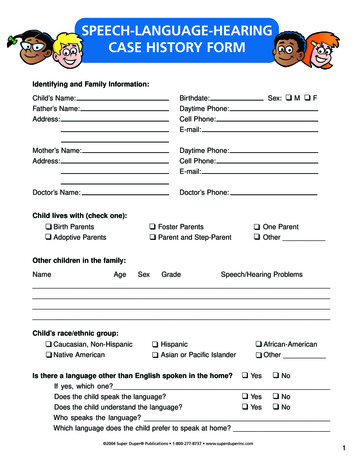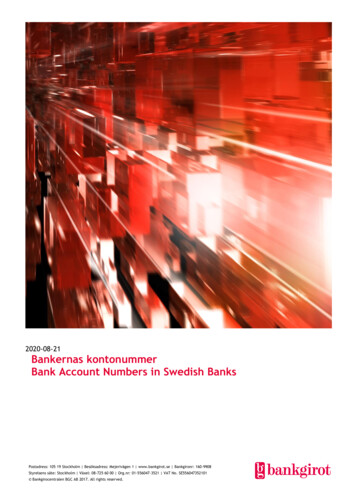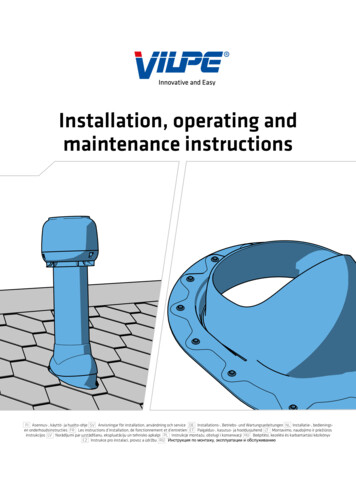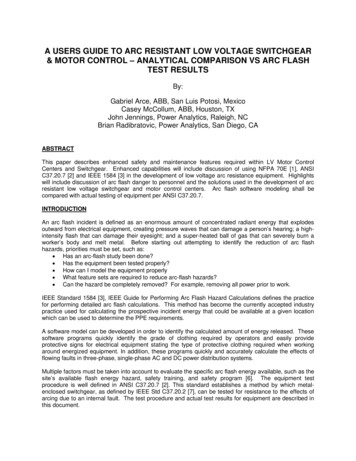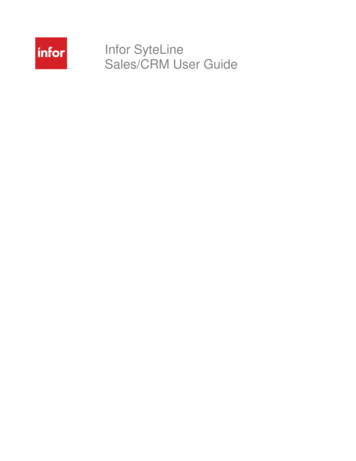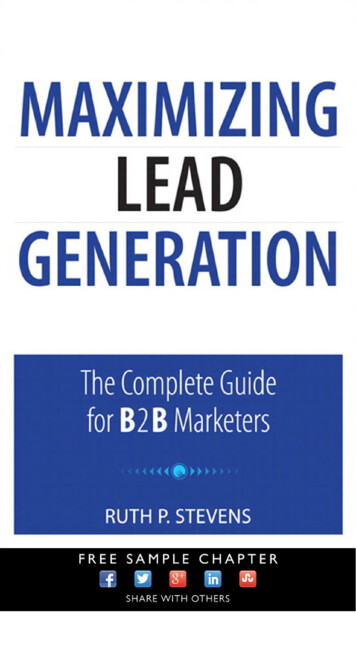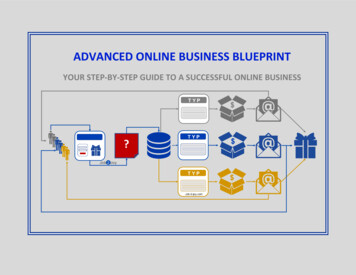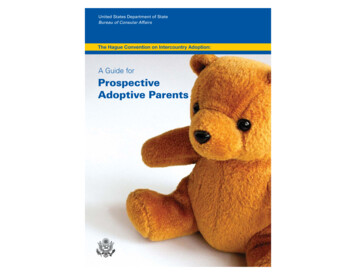
Transcription
United States Department of StateBureau of Consular AffairsThe Hague Convention on Intercountry Adoption:A Guide forProspectiveAdoptive Parents1
The Hague Convention on Intercountry Adoption:A Guide forProspectiveAdoptive Parents*Publication Number 11373Bureau of Consular AffairsU.S. Department of StateReleased October 20062*Disclaimer: The following is intended to serve as a very general guide for prospectiveadoptive parents to gain a basic understanding of the elements of the Convention, theIntercountry Adoption Act of 2000 (IAA) and its implementing regulations that might beof particular interest. It is not a substitute for the actual provisions of the Convention,the IAA or the regulations, nor is it a comprehensive summary of the regulations or theindividual sections discussed. It should not be used to provide a definitive descriptionof all the requirements for completing a Hague Convention adoption. In the case of anyinconsistencies between this document and the regulations, the regulations govern. Foradditional information, please send your question(s) by e-mail to AdoptionUSCA@state.gov.
A Guide forProspective Adoptive ParentsTable of ContentsPart One: An Overview . . . . . . . . . . . . . . . . . . . . . . . . . . . . . . 3Part Two: Working with an Agency . . . . . . . . . . . . . . . . . . . . . . 11Part Three: Frequently Asked Questions . . . . . . . . . . . . . . . . . . . 21Glossary** . . . . . . . . . . . . . . . . . . . . . . . . . . . . . . . . . . . 25Appendix: Helpful Links and Parent Support Organizations . . . . . . . . 28Table of ContentsThe Hague Convention on Intercountry Adoption:** Terms in bold throughout the text are located in the glossary.41
The Principles of the ConventionChanges to the Intercountry Adoption ProcessNew Standards for Adoption Service ProvidersProfessional Adoption PracticesEthical Adoption PracticesOverviewPart One: An OverviewThe Hague Convention on Protection of Children and Co-operation in Respectof Intercountry Adoption (the Convention), is a multilateral treaty concluded onMay 29, 1993 in The Hague, Netherlands. The Convention entered into force forthe United States on April 1, 2008.The United States signed the Convention in 1994. In 2000, the U.S. Congresspassed the Intercountry Adoption Act (the IAA), which provides for U.S.implementation of the Convention. At the same time, the Senate also gaveits advice and consent authorizing U.S. ratification of the Convention oncepreparations for its implementation are in place. The Department of State (theDepartment) was designated as the U.S. Central Authority with respect to theConvention and completed these preparations in 2007.To date, more than 75 countries have joined the Convention, includingmany of the countries from which U.S. citizens adopt most frequently.(See pages 6-7 for a list of Convention countries.) This brochure refersto countries that have joined the Convention and with which theUnited States will have a treaty relationship under the Convention asConvention countries and to adoptions that take place between Conventioncountries as Convention adoptions.This guide for prospective adoptive parents focuses only on cases involvingchildren who will be immigrating to the United States from a country of originthat is a Convention country (incoming cases). This guide does not addresscases involving U.S. citizen children who will be emigrating to anotherConvention country (outgoing cases) or children immigrating to the UnitedStates from non-Convention countries. Further, this guide outlines the newaccreditation and approval standards applicable to adoption service providersthat may be of interest to prospective adoptive parents.23
OverviewThe United States strongly supports the principles of the Convention, whichstrengthen protections for children, birthparents, and prospective adoptiveparents in the adoption process. The Convention provides a framework forConvention countries to work together to ensure that adoptions take place inthe best interests of children and to prevent the abduction, sale, or trafficking ofchildren in connection with intercountry adoption.Information on these regulations, published in the Federal Register, canbe found at Adoption.State.Gov.Prospective adoptive parents should know that, in order to be accredited, theirConvention-accredited adoption service provider has been evaluated basedon comprehensive standards contained in the accreditation regulations. As ageneral matter, all adoptions from Convention countries must involve a primaryadoption service provider that is accredited.OverviewThe Principles of the ConventionChanges to the Intercountry Adoption ProcessIn order to implement the Convention, several important changes have beenmade to the way intercountry adoptions with Convention countries are handledin the United States.One of the most significant changes concerns the adoption service provideraccreditation process. Previously, to perform intercountry adoption services,adoption service providers needed only to be licensed by the states in whichthey operate. Now however, the United States ratified the Convention, however,U.S. adoption service providers generally need to be accredited pursuant to thestandards established by the United States should they wish to provide adoptionservices in cases involving the United States and another Convention country.In order to provide adoption services in connection with Conventionadoption cases, your adoption service provider must generally beaccredited on a national level.In the summer of 2006, the Department designated two accrediting entitiesto perform accrediting functions—the Council on Accreditation (COA) and theColorado Department of Human Services. The Department monitors theseaccrediting entities to ensure that each performs its functions in compliancewith the Convention, the IAA and its implementing regulations, other applicablelaw, and the accrediting entity agreement with the Department.New Standards for Adoption Service ProvidersThe accreditation regulations published in February 2006 are designed toensure that U.S. adoption agencies perform their duties in a manner that isconsistent with the Convention and the IAA.4Subpart F of the accreditation regulations (22 CFR Part 96) contains thestandards that accrediting entities use in evaluating applicantsfor accreditation.Adoption service providers are not be required to meet every aspect of everyapplicable standard in order to be accredited. Instead, accrediting entitiesmay accredit an adoption service provider if that provider is in substantialcompliance with applicable standards developed by the accrediting entities andapproved by the Department, as outlined in section 96.27 of the accreditationregulations (22 CFR Part 96).The standards in subpart F are organized into nine major divisions:1. Licensing and Corporate Governance2. Financial and Risk Management3. Ethical Practices and Responsibilities4. Professional Qualifications and Training for Employees5. Information Disclosure, Fee Practices, and Quality Control Policiesand Practices6. Responding to Complaints and Records and Reports Management7. Service Planning and Delivery8. Standards for Cases in which a Child is Immigrating to the UnitedStates in Connection with an Adoption (Incoming Cases)9. Standards for Cases in which a Child is Emigrating from the UnitedStates in Connection with an Adoption (Outgoing Cases)5
Countries that have joinedthe Convention as of November sBelgiumBelizeBoliviaBrazilBulgariaBurkina FasoBurundiCanadaChilePeople’s Republic of ChinaColombiaCosta RicaCyprusCzech RepublicDenmarkEcuadorEl iaLuxembourgMadagascarMaliMaltaMauritiusConvention countriesNot yet a Convention country (signed but not ratified)Non-Convention countries6MexicoRepublic ofMoldovaMonacoMongoliaNetherlandsNew rtugalRomaniaSan MarinoSeychellesSlovakiaSloveniaSouth AfricaSpainSri LankaSwedenSwitzerlandThailandTurkeyUnited Kingdom of GreatBritain and Northern IrelandUnited StatesUruguayVenezuelaPlease note: Before the United States ratifies the Convention, the Department must determine(pursuant to Article 44(3) of the Convention) whether to object to any countries that haveacceded to the Convention. If the United States objects to a country, it will not have a treatyrelationship under the Convention with that country and adoptions between the United Statesand that country will not be governed by the Convention. At the time of U.S. ratification, theDepartment will include on its website a list of countries with which the United States will havea treaty relationship under the Convention.
OverviewThe accreditation regulations work to ensure that your adoption serviceprovider operates using sound professional practices. Some examples of theprofessional practices that are required of an adoption service provider includethe following standards: The agency has (or, in the case of an individual, is) a CEO or equivalent officialwith an appropriate educational and management background and experiencein adoption services. The agency has a board of directors or governing body that overseesthe agency. The agency operates on a sound financial basis, maintaining on average atleast two months cash reserves to meet its operating expenses. The agency maintains directors’ and officers’ insurance, errors and omissionsinsurance, and professional liability insurance. The agency properly trains their employees on intercountry adoption.Adoption service providers must also disclose to the accrediting entity: Any written complaints against their agency Past or pending investigations by public authorities against their agency Instances in which their agency’s license has been suspended or cancelled Instances when their agency has been found guilty of a crime or any civil oradministrative violation Disciplinary actions against their agency Bankruptcy petitionsOverviewProfessional Adoption PracticesThe accreditation regulations establish consistent standards of practicefor adoption service providers.Previously, there were no uniform requirements for agencies or persons thatprovided intercountry adoption services. Although intercountry adoption willalways be a complex process, the safeguards in the IAA and the regulations aremeant to ensure that only legitimate and sound agencies are able to provideservices in Convention adoptions.Ethical Adoption PracticesThe accreditation regulations also work to ensure that your adoption serviceprovider operates using ethical practices. For example, agencies must havea written policy expressly forbidding the agency, its employees, and agentsor facilitators who operate under the supervision of the agency, from givingmoney to a child’s birth parents (or other individuals) as payment for a childor as an inducement to release a child. An agency does not offer incentive feesfor locating children or placing children for adoption. In addition, agencies arerequired to subject their finances to independent audits to comply with ethicalpractices.89
Selecting Your Adoption Service ProviderSigning Your Adoption Service ContractAdoption FeesLiability WaiversDisruption and Dissolution PlansProceeding with Your AdoptionPrimary Providers and Supervised ProvidersHome StudiesTraining of Prospective Adoptive ParentsChild’s Medical RecordsThe Transfer of the ChildPost-Adoption ReportingPreserving Adoption RecordsComplaining About Your AgencySelecting Your Adoption Service ProviderChoosing an adoption service provider is a decision that you should makewith great care. Generally, in accordance with the applicable standards,only accredited adoption service providers (which can be organizationsor individuals) are eligible to provide adoption services in Convention adoptions.On a quarterly basis, each accrediting entity makes required informationavailable to the public about each agency it has accredited, in addition to eachagency that is denied accreditation.Working with an AgencyPart Two: Working with an AgencyThe Department maintains a list of accredited adoption service providersat Adoption.State.Gov.11
Working with an Agency Its adoption service policies and procedures (including general eligibilitycriteria and all fees) The supervised providers (in the United States and overseas) who would beexpected to work with the prospective adoptive parents and the costs of theirservices A sample written adoption services contractAccredited adoption service providers will also make the following informationavailable to you upon request: The number of adoption placements per year for up to three years prior, andthe number and percentage of those placements that remain intact, aredisrupted, and have been dissolved The number of parents who apply for adoption on a yearly basis The number of children eligible for adoption and awaiting an adoptiveplacement referral via the adoption service providerSigning Your Adoption Services ContractOnce you choose an accredited adoption service provider, you will be expectedto sign an adoption services contract with that agency. As noted above, theadoption service provider will provide you with a sample written adoptionservices contract similar to the one that you would be expected to sign shouldyou proceed to use that agency.Additionally, to protect you from unexpected fees and from being charged forservices not provided, adoption service providers will present you with a writtenproposal of their expected total fees and estimated expenses before providingany adoption service. In addition, the adoption service provider will explainwhen additional fees may be charged, the refund policy, and how the fees andexpenses must be paid.12Adoption FeesBefore providing any adoption services to you, your adoption service providermust itemize and disclose in writing the following categories of fees andestimated expenses: The home study fee Adoption expenses in the United States Foreign country program expenses Expenses incurred in care of the child Translation and document expenses Contributions to child welfare service programs in the child’s country of origin Fees for post-placement and post-adoption reports Third-party fees Travel and accommodation expensesThe adoption service provider must be able to reference a written policy statingthat you are not ordinarily responsible for additional fees and expenses beyondthose disclosed in the adoption services contract. In the event that unforeseenadditional expenses arise, the adoption service provider is permitted to chargeyou for the expenses only if:1. It discloses the fees and expenses in writing to the prospectiveadoptive parents.2. It obtains the specific consent of the prospective adoptive parents priorto expending any funds in excess of 1000.Working with an AgencyYour adoption service provider should disclose specific information about itsoperations and procedures in writing to you upon initial contact including, butnot limited to, the following:3. It provides written receipts to the prospective adoptive parents for feesand expenses.Liability WaiversThe regulations allow adoption service providers to require you to sign a waiverof liability only if the waiver complies with applicable state law. All waivers arelimited and specific and are based on risks that have been discussed andexplained in your adoption services contract.13
Working with an AgencyDisruption and Dissolution PlansYour adoption service provider will include a plan in the adoption servicescontract that outlines the organization’s responsibilities in the case of adisruption of the adoption placement.The plan in case of a disruption addresses: Who will have legal and financial responsibility for the transfer of custody ofthe child in an emergency Who will assume care of the child How the adoption service provider will take into consideration the child’swishes, the child’s age, and the length of time the child has been in the UnitedStates How the Central Authority of the child’s country of origin and the U.S. CentralAuthority will be notified Under what circumstances might it be in the best interest(s) of the child toreturn him or her to the country of originAdoption service providers will inform prospective adoptive parents in theadoption services contract whether they will or will not provide you with anypost-adoption services. Moreover, the agency will inform prospective adoptiveparents if it will provide services in the event of dissolution of the adoption—andif it will—the agency must provide a plan describing its responsibilities.The regulations define these adoption services as:1) Identifying a child for adoption and arranging an adoption;2) Securing the necessary consent to termination of parental rightsand to adoption;3) Performing a home study and reporting on prospective adoptiveparents or a background study and report on a child;4) Making non-judicial determinations of a child’s best interests and ofthe appropriateness of an adoptive placement;5) Monitoring a case after a child has been placed with prospectiveadoptive parents until final adoption; and6) Assuming custody of a child and providing childcare or any othersocial service, when necessary, because of a disruption pendingalternative placement.Primary Providers and Supervised ProvidersThe adoption service provider that is responsible for ensuring that all sixadoption services are provided to you is called the primary provider. Primaryproviders can be organizations or individuals who are accredited. They may useother agencies, persons, or non-governmental entities to provide one or moreof the adoption services, but that adoption service provider must generallyoperate under the supervision of the primary provider. These adoption serviceproviders are called supervised providers. Supervised providers may be agents,facilitators, attorneys, or other organizations working either in the United Statesor in a Convention country.Working with an AgencyIt is important to keep in mind that there are inherent financial and emotionalrisks associated with every adoption. You and your adoption service provider areencouraged to discuss these risks openly and candidly. You may find it beneficialto consult with other parents or support groups about the risks and concernsassociated with adoption. You may also find it helpful to consult with an attorneywhen reviewing an adoption services contract.The primary provider develops and implements a service plan for providing alladoption services to you and provides all such services either directly or byusing, among other providers, supervised providers in the United States or inanother Convention country.Proceeding with Your AdoptionWith certain limited exceptions, for every Convention adoption, an accreditedagency is responsible for ensuring that six adoption services are provided.14Note: More information about primary providers and supervised providerscan be found in sections 96.44 - 96.46 of the accreditation regulations.15
Working with an AgencyChild’s Medical RecordsThe accreditation regulations include home studies in their definition ofadoption services. They also set forth several provisions designed to ensure thatthe home study is conducted in a professional manner and that it is transmittedto the proper authorities in an expeditious fashion. For example, the regulationsrequire that:Adoption service providers are responsible for providing you with an Englishlanguage translation of the child’s medical records, no later than two weeksbefore the adoption or two weeks before the date when you travel to the countryof origin to complete the adoption (whichever is earlier). Adoption serviceproviders make reasonable efforts to obtain available information, including thefollowing: The adoption service provider ensures that the home study is performed inaccordance with state and federal law.The agency’s employee who conducts the home study is not only authorizedor licensed to complete a home study under the laws of the states in whichhe or she operates, but also is supervised by someone who has priorexperience in family and children’s services or intercountry adoption. Adoptionservice providers must take all appropriate measures to ensure the timelytransmission of the approved home study to the Central Authority of the child’scountry of origin.The expected total fee and estimated expenses for a home study are disclosedin writing.A social work professional or organization that only performs a home study ora child background study in the United States in connection with a Conventionadoption, and does not provide any of the other adoption services in the case isknown as an exempted provider, and does not have to be accredited. However,the home study performed must subsequently be approved by an accreditedadoption service provider.Training of Prospective Adoptive ParentsThe accreditation regulations further specify that the primary providermust offer at least ten hours of training (independent of the home study) toprospective adoptive parents before they travel to the country of origin toadopt the child, or before the child is placed with the family for adoption. Thegoal of this regulation is to promote a successful Convention intercountryadoption. Such mandatory training addresses a wide range of topics, includingthe intercountry adoption process, developmental risk factors associated withchildren from the expected country of origin, and attachment disorders. Thetraining also prepares you for the adoption of a particular child, when possible.Adoption service providers record the final nature and extent of the training inthe adoption records.16 The date that the Convention country or other child welfare authority assumedcustody of the child and the child’s condition at that time History of any significant illnesses, hospitalizations, special needs, andchanges in the child’s condition since the child came into custody Growth data, including prenatal and birth history Specific information on the known health risks in the specific region or countryof origin If a medical examination of the child is arranged, the date of the examination,and the name, contact information, and credentials of the physician whoexamined the child Information detailing all tests performed on the child Current health data Information about the child’s birth family, cultural, racial, religious, ethnic, andlinguistic background Information about the child’s past placements prior to adoption Dates on any videotapes and photographs taken of the childWorking with an AgencyHome StudiesAdoption service providers may not withdraw a referral until you have hadtwo weeks to consider the medical and social needs of the child and yourability to meet those needs.The Transfer of the ChildYour adoption service provider will take every appropriate measure to ensurethat the transfer of physical custody of the child occurs in secure circumstancesand when possible, takes place in your company.17
Working with an AgencyComplaining About Your AgencyAfter your child has been adopted, adoption service providers must complywith the state laws of the jurisdiction where you live regarding the number ofpost-adoption home visits that are required. (Adoption service providers willstill have to comply with all of their state laws.) Some countries of origin havepost-adoption reporting requirements. The adoption service provider includes arequirement for such reports in the adoption services contract.The accreditation regulations establish a method for you to file a complaintagainst an adoption service provider. In general, under the regulations, whena party to a specific adoption case has a complaint about the adoption serviceprovider, the complainant first submits the complaint in writing directly tothat adoption service provider, in addition to the primary provider involvedin the case (if appropriate). If the complaint cannot be resolved through theorganization’s complaint process, among other avenues, the party to theadoption case may file the complaint with the internet-based Hague ComplaintRegistry (HCR). You can find the link on Adoption.State.Gov.When a country of origin requires post-adoption reports, it is important foradoptive parents to fulfill that obligation. The failure of some adoptive parentsto produce post-placement reports has had a negative impact on adoptions byother American parents seeking to adopt from some countries of origin. Youshould consider carefully obligations to provide post-adoption reports beforepursuing adoption in countries of origin that require post-adoption reports.Adoption service providers make a good faith effort to encourage adoptiveparents to provide such reports.To learn more about post-adoption reporting requirements, please nfo/info 2192.html.Once a complaint is filed with the HCR, it will be available to the accreditingentity and the Department for appropriate action, and the Department will beable to monitor the handling of the complaint.The complaint system established by the IAA and its regulations to implementthe Convention serves the following functions: Permits any birth parent, prospective adoptive parent, adoptive parent, oradoptee to file a complaint directly with an adoption service provider Requires adoption service providers to respond in writing to such complaintswithin thirty days Provides for retention of written records of each complaint and the agency’s orperson’s response Prohibits adoption service providers from discouraging complaints and fromretaliating against those who file complaints Encourages a quality improvement programPreserving Adoption RecordsYour adoption service provider retains or archives adoption records in a safe,secure, and retrievable manner for at least 75 years, or the period of timerequired by applicable state law, if that is longer.Such archiving ensures that:1) Personal data gathered for an adoption is used for the purposes for which theinformation was gathered and sensitive individual information is safeguarded;Working with an AgencyPost-Adoption Reporting2) Non-identifying information about the adoptee’s health history or backgroundis accessible to the adoptee and the adoptive parents; and3) A plan exists to transfer adoption records to an appropriate custodian who willensure the accessibility of the records in the event that the adoption serviceprovider ceases to provide adoption services.1819
1. When did the Convention enter into force for the United States?2. What if I am in the process of adopting but my adoption was notfinalized by the time the Convention entered into force for theUnited States?3. What if I was just starting the adoption process when the Conventionenters into force? How will my adoption be affected?4. Can I perform adoption services in a Convention adoption on my own?5. Can all accredited adoption service providers work in every country?6. What happens to an accredited adoption service provider when thereis a complaint lodged against it?7. What action can an accrediting entity take against an accreditedadoption service provider because of a complaint or othernegative information?8. What is temporary accreditation?1. When did the Convention enter into force for theUnited States?The Convention entered into force for the United States on April 1, 2008. Anyadoption between the United States and another Convention country initiatedafter this date needs to comply with the Convention, the Intercountry Act, and itsimplementing regulation.20Frequently Asked QuestionsPart Three: Frequently Asked Questions21
Frequently Asked QuestionsSection 505(b) of the IAA states that neither the Convention nor the IAA (andits implementing regulations by implication) shall apply if the application foradvance processing of an orphan petition (I-600A) or petition to classify anorphan as an immediate relative (I-600) is filed before the date the Conventionenters into force for the United States.3. What if I had just starting the adoption process when theConvention entered into force? How will my adoption beaffected?If prospective adoptive parents did not filed the I-600 or I-600A or equivalentforms before the Convention entered into force, then the entire adoption isgoverned by the Convention, the IAA, and the regulations implementing theIAA. This generally means that prospective adoptive parents need to select anaccredited adoption service provider to provide adoption services in the case.4. Can I perform adoption services in a Convention adoption onmy own?Although an extremely limited exemption in the IAA permits prospective adoptiveparents to act on their own behalf without using an accredited adoption serviceprovider, the Department strongly cautions parents against attempting tocomplete a Convention adoption on their own as the IAA and its implementingregulations are complex. Prospective adoptive parents acting on their ownbehalf may not do so if such conduct is prohibited by state law or the laws of thechild’s country of origin if it is a Convention country.5. Can all accredited adoption service providers work inevery country?Each Convention country has the right to determine which accredited orapproved adoption service providers it will permit to perform adoption servicesin its country. A U.S. accredited adoption service provider may not provideadoption services in another Convention country if that country prohibits it fromdoing so.226. What happens to an accredited adoption service providerwhen there is a complaint lodged against it?When a party to a specific adoption case has a complaint about an accredited/approved adoption service provider, he or she must first submit the complaintin writing directl
A Guide for Prospective Adoptive Parents* *Disclaimer: The following is intended to serve as a very general guide for prospective adoptive parents to gain a basic understanding of the elements of the Convention, the Intercountry Adoption Act of 2000 (IAA) and its imple



